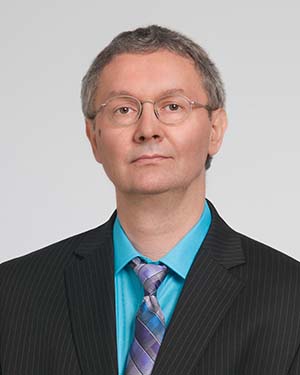Research News
09/09/2022
Dr. Andrei Ivanov Receives $2.5 Million to Study Invading Pathogenic Bacteria
Research will explore the complex roles of cytoskeletal motors in regulating gut epithelila interaction with bacterial pathogens to develop new defensive therapeutics.

Andrei Ivanov, PhD, a staff member in the Department of Inflammation & Immunity at Cleveland Clinic’s Lerner Research Institute, has been awarded a $2.5 million grant from the National Institutes of Health to study the strategies bacterial pathogens use to colonize intestinal epithelial cells, which provide the first line of defense against pathogenic bacteria.
The five-year grant will support research to identify new targets for therapeutic intervention to improve treatment for patients suffering from severe gastrointestinal disorders, including those most vulnerable – the immunocompromised, elderly populations and infants in developing countries who experience high mortality rates.
“This is a totally new focus for our lab,” says Dr. Ivanov. “Our investigations will concentrate on two types of pathogenic bacteria that have particular threats to certain populations of people.”
The first type includes Enteropathogenic Escherichia coli (EPEC) and Enterohemorrhagic E. coli (EHEC), which attach to the epithelial barrier and grow at the epithelial surface. These bacteria induce disease systems, such as severe diarrhea, which is recognized as a significant health threat particularly in developing countries.
The second type includes invading bacteria, such as Adherent-Invasive Escherichia Coli (AIEC) and Salmonella, which have the ability to adhere to and invade intestinal epithelial cells, as well as to survive and replicate within them.
The AIEC invasion is also associated with Inflammatory Bowel Disease (IBD). Patients with Crohn’s disease, for example, have a high abundancy of invaded bacteria in their gut wall that can complicate the development of IBD.
“We need to know more about these bacterial pathogens invading the intestinal bacterium to discover new protective therapies to stop them,” Dr. Ivanov says.
The grant will support investigations into the complex responses of intestinal epithelial cells that are driven by so-called cytoskeletal motor non-muscle myosin II (NMII) in epithelial cells, which are believed to regulate EPEC/EHEC adhesion to AIEC and Salmonella invasion into the intestinal epithelium. This investigation will be the first study of NMII-functions in regulating enteric bacterial infections in vivo.
Dr. Ivanov’s lab typically investigates the fundamental mechanisms controlling and disrupting the epithelial barrier during inflammation, infection and tumor development. This new research focus will provide insights into how pathogenic bacteria attach and invade the epithelial barrier, not disrupt it.
The investigation began when the team examined epithelial interactions with different pathogenic bacteria in cell culture and mouse models. Research revealed the opposite effects of NMII inhibition on bacterial attachment and invasion into epithelial cells than those expected.
“We were intrigued by our findings, and upon further investigations, learned this essential mechanism controlling bacterial attachment and invasion of epithelia cells was not well understood and depended on the varying molecular features of NMII,” Dr. Ivanov says. “This led to the formulation of an innovative hypothesis, research plan and finally, successful grant application.”
The research will offer new insights and a more comprehensive understanding of the diverse functions of NMII in epithelial cells and their regulation of complex host pathogen interactions, establishing different niches for bacterial colonization of the gut.
Featured Experts
News Category
Related News
Research areas
Want To Support Ground-Breaking Research at Cleveland Clinic?
Discover how you can help Cleveland Clinic save lives and continue to lead the transformation of healthcare.
Give to Cleveland Clinic